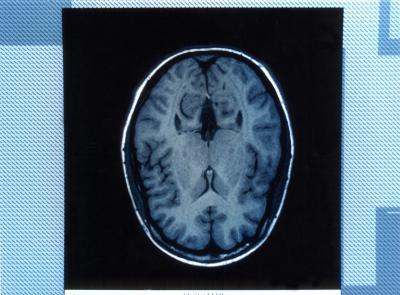A new University of Colorado at Boulder study shows people have the ability to suppress emotional memories with practice, which has implications for those suffering from conditions ranging from post-traumatic stress disorder to depression.
The study, which measured brain activity in test subjects who were trained to suppress memories of negative images, indicated two mechanisms in the prefrontal region of the brain were at work, said CU-Boulder doctoral candidate Brendan Depue, lead study author. The study may help clinicians develop new therapies for those unable to suppress emotionally distressing memories associated with disorders like post-traumatic stress disorder, phobias, depression, anxiety and obsessive-compulsive syndrome, he said. MRI brain scan. Credit: NIH
MRI brain scan. Credit: NIH
The study was published in the July 13 issue of Science. Co-authors on the study included CU-Boulder Associate Professor Tim Curran and Professor Marie Banich of the psychology department. All three authors are affiliated with CU-Boulder’s Center for Neuroscience and the Institute of Cognitive Sciences, and Banich also is affiliated with the CU-Denver and Health Sciences Center.
“We have shown in this study that individuals have the ability to suppress specific memories at a particular moment in time through repeated practice,” Depue said. “We think we now have a grasp of the neural mechanisms at work, and hope the new findings and future research will lead to new therapeutic and pharmacological approaches to treating a variety of emotional disorders.”
During the training phase of the study, subjects were asked to learn 40 different pairs of pictures, each pair consisting of a “neutral” human face and a disturbing picture such as a car crash, a wounded soldier, a violent crime scene or an electric chair, Depue said.
After memorizing each associated pair, the subjects were fitted with special viewing goggles and placed in MRI scanners at CU’s Health Sciences Center in Denver. Subjects were shown only the face images and asked to either think about, or not think about, the disturbing image previously associated with each face, he said.
The functional brain imaging scans taken during the study indicated the coordination for memory suppression occurred in the brain’s prefrontal cortex, considered by neuroscientists to be the “seat of cognitive control,” he said. The team found that two specific regions of the prefrontal cortex appear to work in tandem to suppress particular posterior brain regions like the visual cortex, the hippocampus and amygdala, which are involved in tasks like visual recall, memory encoding and retrieval, and emotional output, he said.
“These results indicate memory suppression does occur, and, at least in nonpsychiatric populations, is under the control of prefrontal regions,” the researchers wrote in Science. The most anterior portion of the prefrontal cortex highlighted in the study is a relatively recent feature in brain evolution and is greatly enlarged in humans when compared to great apes, said Depue.
The study showed the subjects were able to “exert some control over their emotional memories,” said Depue. “By essentially shutting down specific portions of the brain, they were able to stop the retrieval process of particular memories.”
Depue speculated that memory suppression could be a positive evolutionary trait, using the example of a Stone Age hunter narrowly escaping from a lion while hunting antelope. “If the hunter became so beleaguered by memories of that incident that he stopped hunting, then he would have starved to death.”
It is not clear to what extent an extremely traumatic emotional memory, like a violent battlefield incident or a crippling car accident, manifests itself in the human brain, said Depue. “In cases like this, a person could need thousands of repetitions of training to suppress such memories. We just don’t know yet.”
Originated by psychologist Sigmund Freud more than a century ago, the concept of repressed memories is extremely controversial, said Depue. There is considerable debate today over whether repressed memories and suppressed memories are interchangeable terms, and even as to whether repressed memories exist at all, he said.
“The debate over repressed memories probably won’t be resolved in my lifetime,” said Depue. “I think the important thing here is that we have identified neural mechanisms with potential for helping the clinical community develop new therapeutic and pharmaceutical approaches for people suffering from emotional disorders.”
Source: University of Colorado